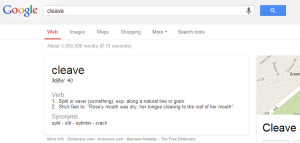Pedants on the web have been all het up this week as Google added this definition of the word ‘literally’ to its annals.
This second definition, for clarity, being the meaning used by ignoramuses who don’t know the word ‘figuratively’.
Used to acknowledge that something is not literally true but is used for emphasis or to express strong feeling.
Let us just look at this second meaning; where the definition requires use of the word that it itself is trying to define, in order to define it. The recursive nature of the phrase should immediately have alarm bells ringing and show that the definition is spurious and worthy of skepticism.
So we pause and read it again and see that not only is the phrasing recursive, but it negates itself. The statement is of the logical form “x = not x”. This definition cannot even be logically correct. It is just plain wrong.
Now it may be that the meaning it is trying to describe is indeed in such prevalent use as to be considered a correct meaning, but that does not justify the slapdash work of Google in describing the apparent dichotomy. We already have words in the English Language that have meanings that are their own opposite. Cleave for instance, means both to split apart and to join together. Google seem to cope perfectly well with that one.
The more I think about this, the more I worry that the problem isn’t the decline of English; languages will always evolve and Canutes like us will continually, futilely attempt to resist the tide.
The reference guides that are the formal record of matter for such things have a duty to present not only the de facto usage of words, but also the etymology and responsibly, accurately describe where there are issues. Here, for instance, there is a problem when Google (surely, these days, this organ must have a duty of care to the quality of information it propagates) allows a definition of a word to be logically inconsistent. Were a user of Google to rely on it for dispute resolution (eg, to reference it within a company’s style guide), then this will obfuscate instead of clarifying.
So whilst I rail against the abuses of language, my real despair is that this particular case calls into question the veracity and reliability of the supposed backstops of the facts of the matter. What next; will we find that Wikipedia isn’t really peer reviewed by academic experts?


